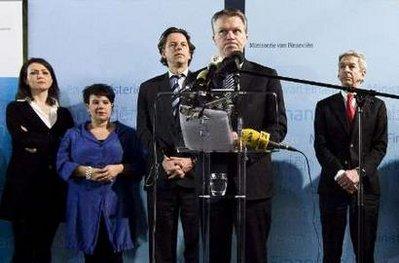Dutch gov't falls over Afghan mission
The Dutch coalition government has collapsed after failing to agree on whether to extend the country's military mission in Afghanistan. Analysts say the political fallout will leave an uncertain future for 1600 Dutch soldiers fighting there.
 |
|
Netherlands' Finance Minister and Labour Party leader Wouter Bos, flanked by his party members, announces his party's withdrawal from Dutch Prime Minister Jan Peter Balkenende's three-party alliance in The Hague February 20, 2010. Balkenende's coalition government collapsed on Saturday when the two largest parties failed to agree on whether to withdraw troops from Afghanistan this year as planned. |
After a 15-hour marathon session concerning the Afghan issue, Dutch Prime Minister Jan Peter Balkenende announced that the Labor Party, the second largest in his three-party coalition, is quitting.
In a media briefing on Saturday, the Prime Minister says the core of the disagreement is on whether to adopt a troop deployment extension. But the three parties failed to reach any agreement.
The leading coalition party, the Christian Democrats, favor extending troop deployments in Afghanistan past the August deadline. But Deputy Prime Minister Wouter Bos's Labor Party bitterly opposed the extension, insisting Dutch troops should be brought home on time.
Balkenende says his alliance would continue in office together with the small Christian Union, but analysts say early elections are inevitable.
The current government is Balkenende's fourth cabinet. It was also the fourth time he failed to carry a coalition to the end of a full-four-year term.
 0
0 






